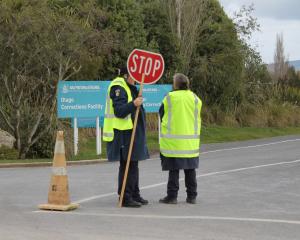
For the past five years, the clinical leader at Dunedin Hospital's emergency department has treated a dog bite wound nearly every week.
The worst injury was to a toddler's cheek.
''The child was about 18 months old and it was very difficult to suture,'' Dr Collins said.
In each case, she would ask for the breed of the dog, to try to determine the force of the bite and the depth of the wound.
''If you're bitten by a chihuahua, it's not going to be the same as being bitten by an Alsatian.''
The breed of attacker varied greatly but was often a mongrel, she said.
Most bites were minor, usually on the hand and arms.
Face bites were rare, she said.
However, data on how many people were treated for dog bites in Dunedin was inaccurate because doctors coded the injuries differently.
''The coding system is very eclectic.''
Dunedin City Council senior animal control officer Peter Hanlin said when a doctor treated a dog bite, the hospital had no obligation to call animal control.
He had never received a referral from a hospital.
Mr Hanlin said most dog bites were not reported to animal control.
''A large percentage of the dog bites that occur are by a family pet on a family member, or the dog is known to the person who is bitten, and then there is a reluctance to report the matter to council because we take an affirmative action.''
ACC claims gave the clearest picture of the prevalence of dog bites, he said.
ACC figures revealed 547 claims for dog-related injuries were lodged in Otago last year and another 226 in Southland.
Between both regions, 39 of the victims were children aged under 5, and 56 were aged between 5 and 14.
In New Zealand last year, 12,638 claims were lodged. In 2013, that figure was 12,796, the highest in 10 years.
Nationally, 841 claimants were children under 5, and 1502 were aged between 5 and 12.
Mr Hanlin said nearly 17,000 dogs were registered in Dunedin.
He estimated 10% of dogs in Dunedin were unregistered.
The responsibility for children being bitten needed to be put ''fairly and squarely'' on the parents, not the dogs, he said, especially if the dog had been tormented by children and the ''danger signs'' were ignored.
''The dog has tolerated and tolerated it, until one day he says `I'm over this' and has a crack.
''It's the parents not taking responsibility for the actions of their own dogs.
''It's not the dogs' fault. The dogs need their own space and their own time out.''
Often, dogs attacked because they were ''scared stiff'' rather than aggressive, Mr Hanlin said.
Several dog owners had a false confidence their dogs would never bite, but no-one could make that guarantee, he said.
Pauline Blomfield, the Dunedin author of How to Keep Kids Safe With Dogs, said dog owners had a responsibility to their dog and the community.
''Owning a dog is a privilege and with that privilege comes a responsibility.''
Owners should not let a dog run free in public, giving false promises to people their dog would never bite, she said.
When dogs attacked, the owners often called it ''out of the blue''.
''It's not. Dogs give off warning signs - always - before they bite.
''They desperately try to get away from the situation they are in and biting is a last resort.''
Some signs dogs made before attacking included yawning and turning their head away, Mrs Blomfield said.
Parents needed to take greater responsibility and teach their children how to interact with dogs.
Children were taught how to cross the road and never to touch a hot stove, but many were allowed to pat a dog tied up outside a shop.
She wrote her book to teach people how to understand dog behaviour and how to avoid being bitten.
''Education is the key.''
Factbox: Seven rules to keep children safe with dogs
- If a dog runs towards you, stand like a tree, cross your arms, look down at your feet and stand very still.
- If a dog's on its own, leave it alone.
- Ask the owner if it's OK before your approach their dog.
- If it's OK, approach slowly and hold out a fist for the dog to sniff.
- Patting a dog on the head can frighten it. Instead rub it under the chin.
- If a dog knocks you over, stay on the ground, roll up like a ball and stay still.
- Stay away from a dog when it's eating.
Source: How To Keep Kids Safe With Dogs by Pauline Bloomfield.











